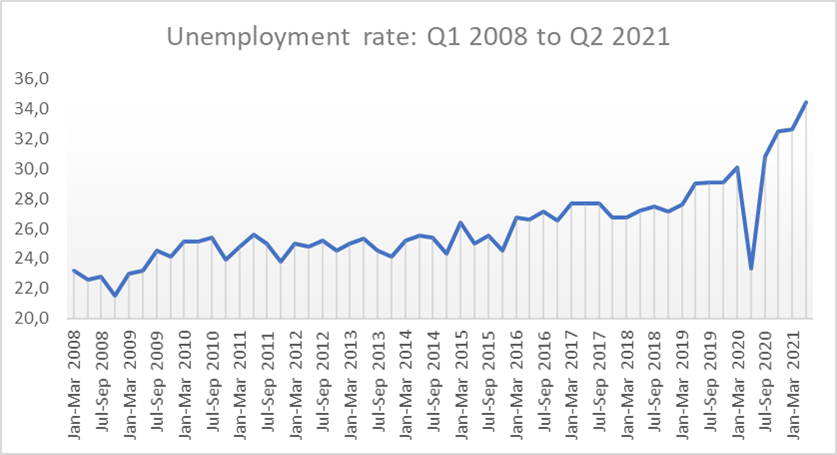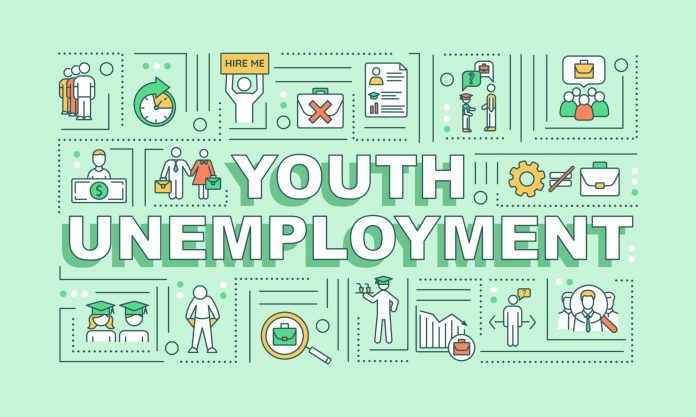As young men and women, approaching the end of our schooling, we often feel our life is ahead of us as we begin to make plans for our future. Some will have the opportunity to pursue further education, some may want to get an early start in the job market, some may be taking a break. The exuberance of youth coaxes us towards our life goals, however, there are several realities in the job market that impact our ability to attain these goals.
South Africa has historically battled high unemployment rates and unfortunately these rates have deteriorated over the last decade and a bit. The Stats SA Quarterly Labour Force Survey (QLFS), provides unemployment data going back as far as 2008 and the trajectory of the labour market in South Africa is alarming as depicted in the figure below:

Source: Stats SA QLFS Q2 2021 Trends Data
The unemployment rate has declined from 21.5% in Q4 2008 to 34.4% in Q2 2021. Focusing on the youngest two age categories (15 to 24 and 25 to 34) we have seen the unemployment rate (over the same period) increase from 44.9% to 64.4% and 24.9% to 42.9% respectively as illustrated in the table below:
| Line Item | 15 – 24 yrs | 25 – 34 yrs | 35 – 44 yrs | 45 – 54 yrs | 55 – 64 yrs | Overall |
| Population (thousands) | 10,240 | 10,337 | 8,591 | 6,285 | 4,146 | 39,599 |
| Labour Force (thousands) | 2,340 | 7,384 | 6,674 | 4,619 | 1,751 | 22,768 |
| Employed (thousands) | 833 | 4,214 | 4,714 | 3,647 | 1,533 | 14,942 |
| Unemployed (thousands) | 1,507 | 3,170 | 1,960 | 972 | 218 | 7,826 |
| Not economically active (thousands) | 7,900 | 2,954 | 1,917 | 1,666 | 2,395 | 16,832 |
| Unemployment rate (%) | 64.4% | 42.9% | 29.4% | 21.0% | 12.4% | 34.4% |
| Labour force participation rate (%) | 22.9% | 71.4% | 77.7% | 73.5% | 42.2% | 57.5% |
Source: Stats SA QLFS Q2 2021 Trends Data
The unemployment rate of those under the age of 35 is concerning not only because of its impact on those individuals to earn an income, but also because of its indirect impact on the economy at large. This article will focus on two specific examples.
- How does this impact the likelihood that someone will have sufficient income to retire?
- How does this impact skills development in the economy?
The first impact of unemployment is that a person cannot earn an income to support themselves and their dependents. In terms of retirement, this means that the person cannot provide for themselves in the future as they aren’t able to start any form of retirement savings until later in life. The above unemployment data suggests that only a small proportion of the population under the age of 35 have the ability to begin saving for retirement. The nature of these retirement savings vehicles is that they require long periods of time to allow the effects of compounded growth to add far more significantly in the last 5 years of the investment vehicle compared to the first 5 years of the investment vehicle. By starting later in life, this reduces the potential size of this fund and hence the impact of the compounding growth over time. Ultimately, this means that the burden on the state in terms of providing for the elderly will be higher if citizens are not afforded the opportunity to begin saving for their retirement earlier (as a result of high youth unemployment rates).
The second impact to consider is how the high youth unemployment rate affects skills development in the economy? This point is somewhat of a self-fulfilling prophecy in that when an economy has a high unemployment rate it means that there are a large number of prospective employees chasing few jobs. This means that employers will often have their choice of high calibre employees (relative to the job requirements) which makes it more difficult for an inexperienced employee to find an entry level job where they can gain experience (and the cycle continues). This means that fewer youths are being presented with opportunities to professionally develop and hence professional development is only taking place at a later point in one’s career than is optimal. This has a knock-on effect in the organisation and creates pressure on those that have received early career development opportunities while those new to the workplace catch up on the development they have missed. This makes it more difficult for an organisation to appoint an entry level worker when more developed employees are available and willing to work for the same salary.
The picture painted in this article is one of an economy that desperately needs to address broader unemployment issues but more specifically, youth unemployment. The troubles associated with youth unemployment not only affect the social spending burden on the state (in the form of retirement benefits) but also the productivity of the country (as employees are developing later in life due to lack of entry level job opportunities). The exact intervention to be used to rectify this youth unemployment crisis is beyond the scope of this article, however, what is certain is that the status quo is unsustainable.
Written by:
Bryden Morton, B.Com (Hons) Economics, Executive Director – [email protected]
Chris Blair, B.Sc Chem. Eng., MBA – Leadership & Sustainability, CEO – [email protected]
About 21st Century:
21st Century is one of the largest Remuneration and HR consultancies in Africa, with a team of more than 60 skilled specialists, servicing over 1700 clients – including non-profit organisations, unlisted companies, government, parastatals and over two thirds of the companies listed on the JSE. 21st Century offers effective business planning with KPA and strategic planning reviews, creative reward practise modelling, operating modelling, change, stakeholder and culture management, training courses and comprehensive organisational development plans. 21st Century continues to offer solutions via virtual channels during the lockdown period.
In this volatile and uncertain environment, the way of working is changing dramatically. There are new – and often unprecedented – challenges that require businesses to plan rapidly and take decisive and immediate action. 21st Century offers a Resilience Audit assessing businesses during COVID-19 for their sustainability, offering these businesses tailor made solutions and developing new remuneration structures and performance measurement systems, as well as helping with managing organisational changes within the business.












